Pro Patria is another legendary Electronic Body Music band that, with and incredible outcome, both in the studio and on stage, has returned in 2017 after a 20-year hiatus. We don’t know when it will be possible to see them live again, but we already know that their new album Godless is going to be played continuously in our stereo. We have talked with Peter Vercauteren, alma mater of Pro Patria, about the past and future of a band that deserved better luck. EBM: Ad infinitum.
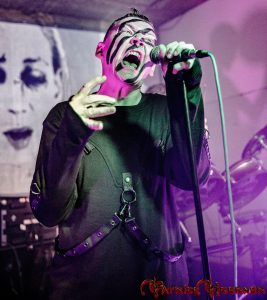 —According to Discogs, you founded your own label PVC Productions in 1986 to distribute your albums and the ones of 7th Avenue Revenge. Is it right or it’s just a mistake? Who are 7th Avenue Revenge?
—According to Discogs, you founded your own label PVC Productions in 1986 to distribute your albums and the ones of 7th Avenue Revenge. Is it right or it’s just a mistake? Who are 7th Avenue Revenge?
—I’m not sure exactly when I created PVC Productions, but it must have been in the very early days indeed. The whole idea came from a friend in 1985 who wanted to create a band and needed someone able to play keys, and so he talked to me about it. In order to be taken seriously, you had to have your music published through a production company, so I invented PVC Productions (PVC was a nickname I had already used since childhood). It felt cool to have that on the cover of our first demos. Mind you, we were still a bunch of teenagers and for all those participating in the project it was merely some sort of a joke. I was the only one who took it seriously from the start, and probably way too seriously I might add.
Can I ask you a question too? Where on Earth did you find the name “7th Avenue Revenge”? That was the original name of the band when we were still doing funk. It was not until 1988 that the founder quit and that I had my hands free to make it my own project, with the help of a new vocalist/percussionist. The music changed completely and even though we still used the original band name during our first gig, straight afterwards we decided to get rid of it and change it into something better.
—Now that you mention it, I wanted to ask you about that funk period. Can you please tell us more about this? How were the first years of Pro Patria?
—Oh dear… Dare I say it? Yes, the intention was to make a band Nile Rodgers would have been proud of. Not my choice, let that be clear, but I had to go along with the idea. The project was a bit of a dead-born baby actually because we didn’t have a guitar nor bass player and we did have a drummer but no drum kit, so things were getting a bit difficult. Now I’ve come to think of it, I was going to be the keyboard player but we didn’t have a real keyboard either, just one of those Casio toys and hauling around my dad’s grand piano turned out to be a sort of an obstacle too. Under the circumstances it became easy for me to appropriate the band for my own goals when I eventually bought a keyboard and sequencer.
—How did you get the idea of calling your band Pro-Patria? Is it from the poem by Horace or the one by Wilfred Owen? Why did you choose such a name?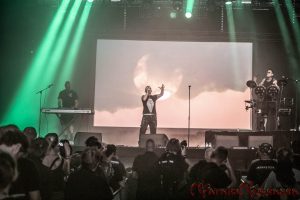
—As you indicate in your next question, I used to be obsessed with Latin at the time. Ever since I was a child, I wanted to know everything about ancient Rome and so it’s not surprising that the new name for the band ended up being Latin as well. I can’t really tell where exactly it came from. Perhaps it was Horace, perhaps the SA42 song was playing in the back of my head too? We simply needed something better than the original name, something catchy, something that people would remember. What I do know for sure is that we were hardly twenty years old and that we were going to change the World, or the nation to start with, so Pro Patria sounded perfect. It’s only afterwards that I realised that some people erroneously identify Pro Patria with Fascism, despite Mussolini having misinterpreted Horace’s words completely. That’s why I keep repeating that people should read Wilfred Owen and Horace so they’ll know that Pro Patria is sarcastic and that it’s about virtue, having a strong mind of your own and standing up against the whims of a changeable mob, rather than mindlessly following someone else.
—Apart from your taste for Latin, what do you think that you have in common with Signal Aout 42?
—This is a very tough question. Obviously, I knew SA42, especially during the real New Beat period (before it became commercial) and in spite of the respect and admiration that I’ve always felt for Jacky Meurisse, I can’t say that he had a great influence on my music because I wanted to do something different.
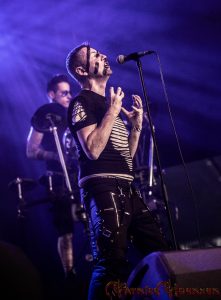 —You said that you discovered EBM after seeing Nitzer Ebb as support act for Depeche Mode? Why did you think that it was the perfect vehicle to express your ideas?
—You said that you discovered EBM after seeing Nitzer Ebb as support act for Depeche Mode? Why did you think that it was the perfect vehicle to express your ideas?
—That’s not entirely correct. I had already discovered EBM a couple of years before that and I’d become a real fan of Front 242 and Skinny Puppy. My original idea was to create a sort of fusion between the hard, electronic disco of Frankie Goes to Hollywood and Front 242. Seeing Nitzer Ebb for the first time, on the other hand, was a real shock, as it was for just about everyone present. It was something nobody had ever seen before … the rawness … the power of pure simplicity … shorts and suspenders… This gig showed me the way in a sense that it made me throw every commercial influence overboard and just be whatever I really wanted to be, without boundaries, without compromise.
Unfortunately, as it turned out, it was not the perfect vehicle to express my ideas because soon hard, electronic music such as EBM would be dead and nobody would be interested in it anymore.
—How was the recording of Spasmaticae? I read that it took you really long because you were trying to enroll in the Air Force. Is it you in the cover of Veni Vidi Vici?
—Yes … that’s me on that cover all right, in a very dark and distant past. The situation was that our first, home-recorded demos had raised the interest of a record label. They had told us to go to a professional studio, record three or four songs decently and then come back to talk about a contract. Unfortunately, studio time was even more expensive back in 1991 than it is today and I had just been enrolled in the Belgian Air Force, which meant that I could only spare time during the weekends. I was actually beginning to fear that it would be the end of Pro Patria, until I met Marc Schellekens, a professional studio engineer. He too saw something in our first demos and so we made a deal that he’d make that professional demo for us in exchange for a small fee and a part of the copyrights in case we should be discovered by a real label. So we recorded Spasmaticae in his home studio whenever I had time off. It took us nine or ten months, also because both Marc and I are perfectionists and every hi-hat click had to have exactly the right pan and velocity, if you see what I mean?
—Seeing the special interest that there is in your first records and although most of the songs appeared later in Quod Erat Demonstrandum, have you ever thought of re-releasing these albums? Something like a collector’s edition?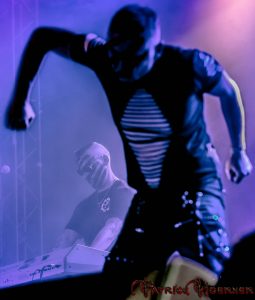
—Well, Quod Erat Demonstrandum was the collector’s edition. It compiled the best of almost ten years of Pro Patria, with a couple of new songs too. Therefore, I don’t really see the need to re-issue the preceding demos. That being said, I’ve recently found the original digital masters of both Spasmaticae and Veni Vidi Vici again. Militaria must be buried in some old box as well and I have been playing with the idea to have all three DAT tapes transferred into.wav, which I could then publish on-line instead of the current files which have all been extracted from an ordinary audio tape.
I prefer to keep those tapes as a memory of the old days and not republish them. Yes, I’m an artist (or at least I try to be one) and have absolutely no understanding of how to make money with music.
—You said that all the companies were more into techno or grunge at the time when you tried to release your first record. Were you ever interested in any of these styles?
—No! Absolutely not! I HATED Grunge and everything it represented, mostly because Grunge had destroyed my world. After Nirvana, nobody was interested in electro/EBM anymore and even the gods from the eighties such as Front 242, Nitzer Ebb and the Frontline Assembly had turned their backs on their origins and had started making Grunge or Techno-inspired music. Even Depeche Mode, the great trendsetter, had become a trend follower. How was insignificant Pro Patria, or any other emerging electro band, ever going to raise an interest under those circumstances? You know, when we had just recorded Spasmaticae, I went back to that record label which had almost offered us a contract in 1991, only to find out that they were not interested in electro anymore. Record labels need to sell and if the only things that sell are Grunge or Techno, then that’s what they’ll produce. After the Celtic Circle bankruptcy, I again went door to door to all of the record labels that might have been interested in us. We had Quod Erat Demonstrandum, a completely finished product, so they wouldn’t even have to invest in studio time. Alas, also the manager of Belgium’s biggest independent label told us that he liked our music very much but that we had to change it into Techno, that we had to become the “Belgian Prodigy” if we wanted to convince him to offer us a contract.
That being said, I did listen to Techno at the time and I really liked what Prodigy, LFO and especially Richard James were doing, but it was not Pro Patria and it would never be. Again, I’m an artist … sigh…
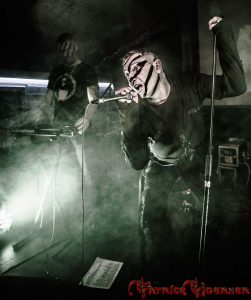 —In Militaria you released only five songs due to cost of the production, did you have more?
—In Militaria you released only five songs due to cost of the production, did you have more?
—Yes, I had plenty more. There were a couple of songs Marc, our producer, didn’t believe in and I had already created the framework for others such as “Mind“ which would later appear on QED. In the end, the deal for Militaria was five songs so we had to make a choice. The only song that shouldn’t have made it was “Discipline“, a track that Marc didn’t like at all but, for some strange reason, I was strongly attached to it, so I insisted. In the end, the vocals for that track were never recorded and the only thing that Marc was willing to do was change the drum sounds into those used on the other tracks and add that guitar-ish sample.
—In this EP, the B-side was called Experimental side, how far do you think that EBM can go in an experimental way?
—I think that EBM should experiment as much as it can. To experiment means to evolve and without evolution you can’t grow and you’ll keep repeating the same old concept forever. Not that this old concept’s bad, far from it… I LOVE it. But everything within the boundaries of this concept has already been done. Why not try to make something new out of it? Don’t we artists owe it to our fans?
Now that we’re talking about this, a well-known EBM festival organiser confided to me a couple of years ago that EBM is dead. All right, he said that after a particularly unsuccessful festival, but he did have a point. What is a music scene worth if we keep repeating the same old sounds, the same old bass lines and vocals, the same old ideology? What is a music scene worth where “old school” is considered a name of honour and blatant copies of old classics are considered “perfect songs”? And to round this off, what is a music scene worth where there almost appear to be more remixes and covers than original songs?
This does not mean that I’m free from blame in this respect and, unfortunately, also Pro Patria has its songs that seem to have originated elsewhere. However, I do try to be as original as possible and I rarely listen to other music, exactly because I don’t want to be influenced. Mind you, as I said, it almost seems that everything has already been done by now, so it’s become increasingly difficult to be original and I suppose also other bands are facing the same ordeal. Therefore, hats off to those great many bands which dare to experiment and which are trying to view EBM from a new angle.
—Was Veni Vidi Vici, the band’s live album a good sampler of your concerts? How were them back in the day? Any special anecdote?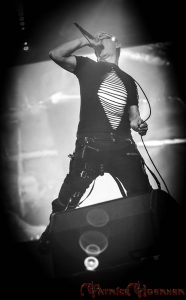
—Yes, Veni Vidi Vici was a pure live recording from 1995, digitally remastered. I could tell you lots of stories from those early gigs, from being on stage with a 38.5° fever, about my buddy being completely plastered, about doing the whole concert twice because the first go didn’t work out as planned, about gigantic light shows in a big hall for an audience of not even fifty or about recovering most of our profit through the coins we found on stage after the crowd threw them at us in order to make us stop.
The most memorable of all, however, was definitely our second gig, on Friday, April 13, 1990. I had organised the whole event and believed it would be a great idea to call it “Friday the 13th Party” and to put a big pirate skull on the flyers. That was a small miscalculation from my part as I had failed to foresee that a title and a flyer like that might attract the wrong people. To my horror, the hall got filled with Hard-Rock fans, big beardy men with long hair wearing ripped jeans who’d probably not take our music too well. What’s more, I had programmed a concert of … more than fifty minutes, plus encores of course. The backing tape was running so once we’d started there was no going back. The first song was still met with an indifferent murmur, but as the gig continued, the crowd was getting angrier and angrier. They started yelling at us, ordering us to get lost and even throwing pints of beer at us. Fortunately, we were on a high stage so we weren’t immediately accessible, but the situation became very grim. It seemed like an age but eventually we had played all of our songs and the tape stopped. I ran off stage as fast as I could, relieved that, in the meantime, most of those present had simply left instead of starting a riot. And then the unthinkable happened. Pierre, the co-singer and percussionist at the time, and after a moderate consumption of alcoholic beverages I might add, leapt on stage again to do the encores. The technician, believing that we were serious, started the tape again and I had no other choice but to follow Pierre’s lead … to the slaughterhouse. Eventually the hall was almost completely empty, apart from those too drunk to get out and only a table got demolished. In the end, we could proudly say that Pro Patria had defeated a Hard-Rock army! 😀
—And when everything was ready for your full album Quod Erat Demonstrandum, Celtic Circle declared bankruptcy. I guess it was a difficult blow for you? How did you feel at the time?
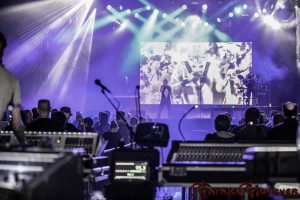 —For us it was the beginning of the end. We were overjoyed to have finally found a label that still believed in us and EBM in general and we had worked so hard on the album. The music had been sent to the factory and the CDs had already been printed when I got the news. I still tried to convince the factory to release our CDs and I’d have been happy to pay for them, but to no avail. Then, as I said, I went again door to door to all of the other labels. I even went to the big Düsseldorf music fair to try to find a distributor, but none would have us or the distribution deal would not be a favourable one for us. After so many years of frustrations, it was incredibly demoralising. Then Bert, Pro Patria’s other half at the time, and I split up because he did want to add some Techno influences to our music whereas I wouldn’t have it. I still did a couple of great gigs with David Vallée (Lith, Eks. Center) as support on stage but I already experienced those as “goodbye” concerts to thank the fans for their support over the years, as if I already knew that Pro Patria would have to die soon. Then, in 1999, my personal situation suddenly changed much for the worse and this meant the final end for Pro Patria, or at least that’s what I thought.
—For us it was the beginning of the end. We were overjoyed to have finally found a label that still believed in us and EBM in general and we had worked so hard on the album. The music had been sent to the factory and the CDs had already been printed when I got the news. I still tried to convince the factory to release our CDs and I’d have been happy to pay for them, but to no avail. Then, as I said, I went again door to door to all of the other labels. I even went to the big Düsseldorf music fair to try to find a distributor, but none would have us or the distribution deal would not be a favourable one for us. After so many years of frustrations, it was incredibly demoralising. Then Bert, Pro Patria’s other half at the time, and I split up because he did want to add some Techno influences to our music whereas I wouldn’t have it. I still did a couple of great gigs with David Vallée (Lith, Eks. Center) as support on stage but I already experienced those as “goodbye” concerts to thank the fans for their support over the years, as if I already knew that Pro Patria would have to die soon. Then, in 1999, my personal situation suddenly changed much for the worse and this meant the final end for Pro Patria, or at least that’s what I thought.
—How was your life during the 20-year gap between this record and the following one? Being EBM such an energetic music, did you find another way of releasing your energy?
—Not really because all of my energy had gone. It was completely absorbed by all the negativity that became part of my life and I prefer not to go too much into detail about that; a lot of what happened during these years was reflected in some of the lyrics of Back to Basics. Let’s just say that I became a broken man. In 2007 I felt so honoured when I was asked to participate in the grand Old School Electrology project, but since I was not allowed to invest one penny in my music anymore, all I could come up with was a badly reworked demo of a song (H2SO4 – Pray for Salvation) that had already been lying on my shelf since the QED production, because at the time I had already been thinking about a successor.
In 2009 I was diagnosed with high-functioning autism and as liberating as this diagnosis should have been 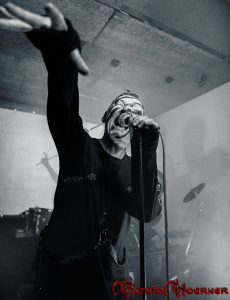 for me, knowing that there was a reason why I felt increasingly tired, intolerant and out of this World, others didn’t see it that way and reacted extremely badly to my disorder. Things got so bad that I had almost forgotten that once there had been a band called Pro Patria.
for me, knowing that there was a reason why I felt increasingly tired, intolerant and out of this World, others didn’t see it that way and reacted extremely badly to my disorder. Things got so bad that I had almost forgotten that once there had been a band called Pro Patria.
—Was it difficult to write songs again? How was the creative process of Back To Basics? Did you want songs that were more direct or was it something not planned?
—No, it wasn’t difficult at all, very much on the contrary I would say. In the meantime, my personal situation had again changed drastically, much to the better this time, and now I’m again surrounded by people who believe in me and who really want me to continue with Pro Patria. So I created my own little studio and started writing a new album. Apart from the “Acid Series” tracks, the roots of which go back to 1997, all of the songs were written in six weeks’ time. Inspiration was like a tidal wave. All of those long years of agony proved a very valuable source – very strong emotions, either positive or negative usually are – and writing the album became very therapeutical; it was for me an important part of the healing process. Therefore it had to sound raw, you had to feel the pain. Perhaps it sounded a bit too painful, also because I was a newbie as far as mixing and mastering was concerned, and that’s why I’m currently remastering it. I don’t know… I just wanted to shout at the World that I’m still here and that I’d arisen from the ashes stronger than ever.
—Where do you find inspiration for your lyrics? Is the current situation being a possible theme for future songs?
—Let me say that writing lyrics is to me the most tedious part of songwriting and it’s often a very difficult process because the lyrics can either make or break the music. Writing about a current situation is usually not a very good idea because you risk that your song becomes outdated or even irrelevant soon. Yet I feel compelled to write about the current situation of this planet, both political and environmental, because, as most of us know, this situation isn’t very good at all. I will keep repeating this and I will keep shouting ever louder until people listen. Not that I’m very optimistic because people (in general) still seem to be more concerned about fashion and social media than about the future of our planet.
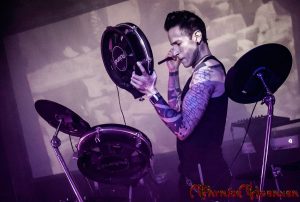 —How has changed your gear throughout the years? Has your way of composing changed with the technology?
—How has changed your gear throughout the years? Has your way of composing changed with the technology?
—My gear? Well, obviously it has changed a lot. The pre-2000 songs have all been composed on a single Roland D-20 keyboard and in the studio we had i.a. a D-70, a Juno and an S-10 sampler at our disposition. I know that many EBM fans will frown at this because those are the sorts of instruments you’d rather associate with Engelbert Humperdinck, not so much with EBM, but personally I believe that music (including EBM) is not about which instruments you use but about how you use them. On Back to Basics, for instance, I drove the D-20 through some old guitar pedals to get some amazing sounds. Dare I say that as from Executioner I don’t use any real instruments at all anymore? It’s all free VSTs! Who says that you have to spend thousands to produce great-sounding music?
No, I can’t say that my way of composing has changed much over time. Perhaps the infinite possibilities that current-day digital instruments offer, make it a little easier, in a sense that a particular sound may trigger an idea for a new song. Still, according to me, a song cannot be based on a sound alone, no matter how great it is. A song is nothing without an idea behind it.
—What’s the meaning of the symbols at the beginning of the songs of Back To Basics?
—Those chemistry elements? Back in 1997 I had the idea of making a CD consisting of one (extremely long) track about all of the chemical elements, hydrogen would evolve into helium, into lithium and so on. It was more of an artistic idea and when I started working on Back to Basics I realised that this would not be the right thing to do on a comeback album. So it became an ordinary album but I still retained some chemistry symbols which best represent the songs in question. It’s a bit of a joke, really.
—You have been remastering the songs of Back To Basics, right? Are you happy now with the result?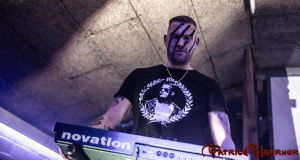
—No, and I will never be. I’m never happy with anything, but at a certain point you have to give up and let go. I hope that my audience is happy about it because that’s the only thing that really matters.
—I read that you listen a lot to Bach. Is classical music your main influence?
—Absolutely. Bach is the alpha and omega of music and he’s the creator of Jazz, which makes him also the origin of all modern music, including EBM. I play his music every day to cleanse the mind and I find a lot of inspiration in his perfect harmony. This may sound strange and at first you may not see any link at all between classical music and EBM. Actually, many people can’t bear to listen to classical music at all. This is a shame, really, because nowhere else will you find such profound emotions (didn’t I say that deep emotions are the best source of inspiration?) and such a thorough understanding of harmony, structure and the power of dissonance, all things which make a song stand out above the rest, yes, also EBM songs.
—Can we say that Executioner (2019) is your first album where everything worked fine, without any problem?
—It depends what you mean with “without any problem”. Of course, Back to Basics had its difficulties with production since I had no clue where to start, but also the production of QED went rather smoothly, in spite of Marc and I regularly clashing because we both have strong personalities.
Let’s say that Executioner was the first time that I’ve done a production all by myself and that I was reasonably pleased, not just with the quality of the songs but also with the sound in general. There are still a number of glitches here and there or things that I wish I had done differently, but hey … you can’t have everything.
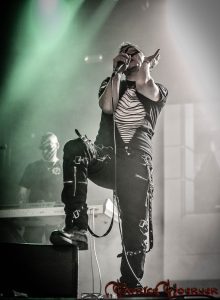 —How did you feel re-recording for that album “Oppression”, the first song you ever wrote? Do you think that you have changed a lot since you wrote that?
—How did you feel re-recording for that album “Oppression”, the first song you ever wrote? Do you think that you have changed a lot since you wrote that?
—Of course, everybody changes after thirty years. It was the very first song we ever recorded on our very first demo in 1988. Actually, I’ve highlighted the change through the intro, as it begins with the intro of the 1988 recording (adding a bit of record cracks to make it sound even more vintage) which then turns into the 2018 version. The original was still about a bunch of youngsters who were full of optimism, ready to take on the World and fight all the oppression. When you turn fifty, you’ve come to realise that some things can’t ever be changed and you see the World from a completely different perspective, more mature, better thought out, though perhaps less energetic and more apathetic.
The original was still a bit poppy, somewhat commercial, because it was written in the transitional period, before the original band fell apart. Throughout the entire history of the band, I’ve wanted to create a version that would really be Pro Patria. Unfortunately, none of the people I’d worked with seemed to like the song… Pierre didn’t like it, so it got binned after the second gig. Bert didn’t like it and also Marc didn’t want it on our demos nor on QED. Having my hands free with Executioner, I finally wanted to have my way, even if it were only for a bonus track. I knew that it wouldn’t really fit in with all the rest because it’s simply too different, but it had to be there at least to mark the 30th anniversary.
The most emotional aspect about it was undoubtedly listening to that old original again. Or perhaps that was the most embarrassing aspect? 😀
—How did you get the idea of doing an acoustic version album of your most popular Pro Patria songs in Naked EBM? Is it going to be an EP or do you want to add more songs?
—Making an acoustic album is something that I’ve always wanted to do, and I think this goes for any musician. A bit like MTV Unplugged, but even more extreme. Just a piano and voice and much of it was improvised on the spot. No effects, apart from a bit of reverb. No place to hide or cover something up and the only way to keep the listener’s ear is through the music itself.
Doing EBM can be frustrating at times because it’s a musical style that doesn’t really allow a lot of freedom. Major keys are as good as excluded (though there are exceptions, e.g. “Don’t Crash” or the chorus of “Masterhit”, both by Front 242) and harmonic solutions are very limited. Therefore I felt the urge to create something in which I could unleash all of my musical creativity. I had already created some acoustic variations on “Death of a Friend” as a hidden track on Executioner and this tasted like more, hence the album Naked EBM. It will definitely become a full album; more songs will be added when the inspiration is right.
It’s the album which I’m personally most proud of, by a mile.
—What can you tell us of your album Godless? So far you have released 8 tracks.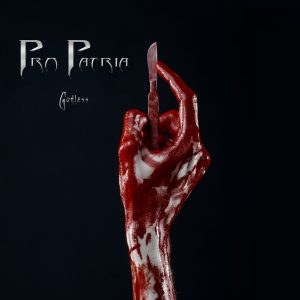
—Executioner was about bridging the gap between QED and Back to Basics. With Godless I want to look at the future and show the listener in which direction Pro Patria will evolve. It will be no-nonsense, razor-sharp and biting. The old themes will still be there but even more explicitly because, in my opinion, we have no more time to lose.
I’m still not sure where the album will lead me; at a certain point, I’ve also been considering making it a double album. Let’s see what inspiration will tell me. I’m currently working on track number nine and it’s getting along well. Hopefully, the people will love it.
—Is “Dignity under Attack” an attack against social media?
—Not as such. There isn’t anything wrong with using social media and it’s nice to find old friends again and to see how they’re doing. What bothers me, though, is that many don’t seem to live in the real World anymore but are only concerned about what their favourite influencer (dreadful word) is up to or about who showed her tits during the latest Big Brother episode. People debase themselves, even mutilate themselves with plastic surgery, just because they want to have more “likes” and because they want other people to “follow them”. Well, if that makes them happy…
Pro Patria’s message has always been: “Be who YOU want to be.” It doesn’t matter who you’re wearing. The only thing that matters is who you are inside.
—We saw you live at W-Fest and it was a great concert. I read in an interview that it was the first time you met the two guys you played with. Can you please tell us more about this?
—When Pro Patria was revived from the dead, it was just me and the first couple of gigs didn’t work well because of that. First I tried alternating between singing up front and standing behind a keyboard. Then I tried just standing up front, but also that was not ideal. When eventually I got invited to play at the gigantic W-Fest, I realised that I’d need back up on stage; otherwise it would be so “empty”. My old buddy Bert had declined the offer and, after all of these years of being out of the business, I didn’t have a clue where to find someone who could help me out. After all, I live in Italy now and I needed someone local. So I turned to Sébastien BlondWülf (Wülf 7), who’d become a close friend via the internet (yes, social media … teeth grinding here) and who’d already done a lot of publicity for the new Pro Patria. He accepted to do the keys and through him I got in touch with Jérémie Venganza (Super Dragon Punch), who’s a great percussionist. We got along well via chat and eventually we met … backstage, a couple of hours before we had to get on stage. When you come to think of it afterwards, it was sheer madness. Well, every now and then a bit of madness doesn’t hurt. You sometimes need to take a leap of faith because, honestly, I think that a part of the success of that concert was exactly that we were all “fresh” and not overly routined. You can tell when a band’s just doing a routine as it transmits less energy to the crowd. Perhaps it was our lack of it that made the crowd cheer? Though I also think that, through some sort of a benign miracle, there was a spark of magic between the three of us. We’re three completely different personalities on stage, but perhaps we complemented each other so well because of that?
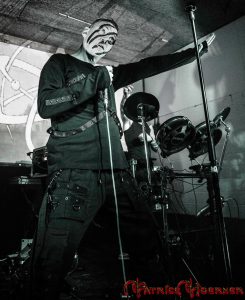 —How do you see the EBM scene now? Any band you would like to recommend?
—How do you see the EBM scene now? Any band you would like to recommend?
—Let me say that it was an incredible surprise when I got invited to play at the Familientreffen and saw how great and professional EBM had actually become. All of those bands sounded so well and the atmosphere was absolutely amazing. Twenty years ago no-one would have believed it. It made me feel even more honoured to have been accepted as a part of all that.
That being said, I have mixed feelings about the EBM scene these days. At one hand there are those who are reluctant to change and insist that we keep repeating the same old ideas. On the other hand, there are many bands that are having a fresh approach with often very surprising results. I don’t like to mention names because I don’t want those who I didn’t mention believe that I think less of them and because it’s easy to forget one or two. Still, there’s one name that springs to mind which deserves to be mentioned here because I’d like to encourage them. They’re new, only active for about 1 or 2 years, but are releasing new material at a very high rate: Hypermond. You can’t call them “pure” EBM and I’m sure that they don’t want to have a single label attached to them. They combine various styles, deeply rooted in the analogue eighties, with amazing rhythms, extremely complex musical layers and very peculiar, female vocals. Go go!!!
—What are the plans of the band for the future?
—With the current COVID crisis and the likelihood that it will still be with us for a considerable time, the life of musicians has suffered a severe blow because by far most of what we earn (from our music) comes from doing gigs. Many are having a very hard time and my thoughts go out to them. Since we haven’t got a clue when concerts will be allowed again, there’s no way I can say when Pro Patria will return on stage. This is a pity because doing gigs has always been the most fun part of being in a band, and I think this goes for all of us.
Apart from that, it’s quite easy to tell you what the future will bring for Pro Patria because I will continue making music until I drop dead. Rest assured that after Godless I will start writing a new album. And another one…. And another one…
Photos: Patrice Hoerner




